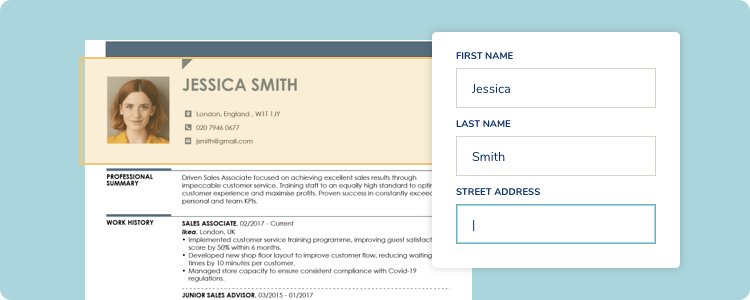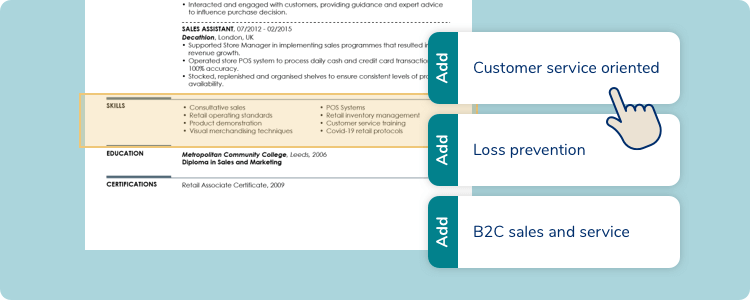Write a CV With No Experience That Starts Your Career
A CV with no experience is most commonly used at the start of your career, though it might also be needed by candidates changing careers. The key to making it work is choosing the right format, focusing on transferable skills, and making the most of any experience you do have.

Our customers have been hired by: *Foot Note
How to write a CV for a job with no work experience
Writing a CV with no experience can feel overwhelming — but it doesn’t have to be. Whether you’re applying for your first job, switching careers, or freshly out of school, everyone has to start somewhere. It’s normal to worry that a lack of experience might hold you back.
But here’s the truth: recruiters don’t expect you to have years of experience at this stage. What they want is to see your potential, and the right CV can do precisely that.
We will show you how to write a CV for a job with no experience, with expert tips, actionable advice, and good CV examples for a first job. We’ve also included CVs with no experience examples to show you exactly how it’s done.
CV with no experience example
This skills-based CV example proves you don’t need work experience to fill a whole CV page professionally. It focuses on transferable skills, education, and interests to show potential and drive. Even without formal jobs, it presents a clear, compelling case to employers.
What to put on a CV with no experience?
How to write a CV if I don’t have any experience? Easily one of the most common questions about CVs with no experience is “what should I include?”. It’s not hard to see why, either. “Work experience” or “Career history” is by far the biggest section on most standard CVs, so most people want to know how they can replace that to make up for their lack of experience.
Here is a full list of things you can include on your CV with no experience:
Personal details – including your name, phone number, email address, and location.
Personal profile or personal statement – this short paragraph introduces recruiters to you as a candidate.
Skills – arguably the most important part of a CV with no experience. While standard applications will skim over their skills, you can spend a lot more time (and words) expanding on your capabilities without making your CV too long. In a way, it’s a silver lining of having no experience!
Education – another area where you can shine is to shift focus away from work experience. You might want to expand on your time at college or university, for example, more than you would if you had a long list of previous jobs to focus on.
Achievements – You may also want to list achievements from your education or personal life, such as sporting accomplishments, attendance awards, or fundraising activities that show you in a positive light.
Qualifications – Education aside, you might have separate qualifications such as online training or a first aid course, which can justify having their own section.
Hobbies or interests – Tread carefully here, as focusing too much on your own interests might highlight a lack of experience, especially if they’re unrelated to the job at hand.
Work-like experience – Even if you don’t have a list of formal positions to reel off, you can talk about other work-like experiences, including volunteer roles or helping the family business.
CV examples for students with no experience
When you’re raring to go, you can try out our CV builder. It has professionally designed templates and pre-written content for every CV, whether for students with no experience or for any job title.
CV with no experience for a Trainee Accountant
When writing a CV with no experience for a trainee accountant position with no prior experience, you'll want to highlight your education and any relevant coursework, skills, and achievements that demonstrate your potential as an accountant.
CV for a teenager with little experience
If you are applying for a job as a teenager, you may have already managed to gain some first work experience in part-time work. Include it in your teenager CV, even if it is not directly related to the position you are applying for. This will show that you are a responsible young person who already has experience in a professional environment.
CV for a graduate student
Recent graduates can include in their CVs for graduated students any projects or internships they undertook during their studies. This will highlight your knowledge and skills. Focus on your achievements and consider adding a section with your interests that might be relevant for the job.
CV with no experience for a high school student
In the case of a high school student, as in the case of a teenager, the likelihood that you already have any specific work experience is rather small. If you are looking for your first job, focus on highlighting your skills. Perhaps you take great photos, manage your social media well, run a blog, or know a foreign language. Put this on your CV!
CV for an international student with no relevant experience
When writing your CV for your first serious job, include any experience you have. Even if it doesn't seem relevant to the position you are applying for. Especially if you are writing a CV for an international student. This will demonstrate that you are responsible, willing to work and that you are familiar with the professional environment and working practices in the UK.
We have CVs for every job title. Visit our CV examples page, check what others put on their CVs and get inspired!
How to write a CV for a job with no experience
Writing a CV with no formal work experience might feel intimidating, but it’s entirely possible to create a strong application by focusing on what you do have: transferable skills, relevant experiences, and a willingness to learn.
It’s a common misconception that no job history means you have nothing to include. In reality, there are many ways to show employers that you’re ready for the world of work.
Here’s what you can include on your CV to show your potential:
- Extracurricular activities – Whether you were part of a school club, sports team or student council, these show teamwork, dedication and time management skills.
- Relevant courses or subjects – If you studied a subject related to the job or completed an online course, include this to demonstrate interest and baseline knowledge.
- Volunteering or community work – Any unpaid work still counts. It shows responsibility, initiative, and often involves useful skills like communication or organisation.
- Personal projects – Built a blog? Designed a poster? Helped with family accounts? Projects like these reflect creativity, self-motivation, and practical skills.
- Internships or short placements – Even a one-week school placement or shadowing experience can show exposure to professional environments.
Things you should avoid:
- Don’t leave the CV blank – No job experience doesn’t mean no experience at all. There’s always something valuable you can include.
- Don’t exaggerate – Be honest about your experience and skills. Recruiters value authenticity, especially when hiring for entry-level roles.
- Don’t include anything you can’t back up – If you list a skill or experience, make sure you can give an example or explain it further if asked.
- Don’t underestimate informal experience – Helping in a family business, tutoring a sibling or caring for someone are all valid contributions.
- Don’t focus on what you lack – Instead of drawing attention to limited experience, highlight what you bring: enthusiasm, willingness to learn, and transferable skills.
Everyone has to start somewhere. A well-crafted CV with no experience plus a good cover letter can still make a strong impression and land you an interview.
How to structure a CV without experience

The standard layout of a CV puts work experience in the limelight, so it’s definitely worth checking out our CV formats with no experience to see how it’s done differently.
STEP 1
Personal details
To start, the top of the page is exactly the same – starting with your personal details before a concise personal statement.
Like this:
Bella Harris
19A Johnson Road
Glasgow, G1 4DH
Mobile: 07912 345 678
Email: bella.harris@example.co.uk

STEP 2
Skills
Here’s where it gets interesting. Instead of moving onto your career history, you’ll focus on your skills. This forms the main body of a CV with no experience, which is why it’s also known as a skills-based CV. Rather than simply listing your skills, you should expand on them to really nail down your key capabilities, such as:
IT Literate
- Highly competent with Microsoft Office
- Quick to learn on new software
- Confident communicator by email
- Familiar with video calling platforms

STEP 3
Education
After skills, move onto education. Again, you can go a little further than a standard CV. Rather than listing the basic details of your courses, consider adding a couple of bullet points about the most relevant modules, tasks completed, or skills developed during that course.
2010
NVQ Level 3: Catering & Food Preparation
City of Bristol College - Bristol
2008
GCSE
Fairfield High School - Bristol

STEP 4
Additional information
If you do have any voluntary work, internships, or similar, now is the time to include it. After that, you can move onto added extras like achievements, qualifications, or interests outside of work. Order these sections starting with whichever you feel is most relevant to the job you’re applying for.
For example:
Achievements:
Consistently achieved the highest turnover in the team, increasing the company's income by 10% compared to previous years.
Or
Languages:
Mandarin, advanced level
French, communicative level
Formatting your CV with no experience
Structure aside, formatting is how you present your CV in terms of the design, layout, and length. Here are our top tips on how to format a CV…
Start with the design
Choosing CV templates with no experience requires a bit more thought than your everyday candidate. You really need to make a professional impression, but at the same time, you don’t want your CV to blend into the mass of other candidates – many of whom will have experience.
So many inexperienced candidates will go for a blank Word document in black and white, in fear of looking too outlandish. However, simple design features like a coloured header or margin can be enough to make your CV pop, without it becoming a free-for-all in terms of appearance.
Be careful with colours
While a small amount of colour can help your CV stand out, it’s important not to go wild to compensate for a lack of experience. The effect will be quite the opposite. Firstly, choose muted colours like grey, navy, dark green, or a pastel blue – and only use one colour (other than black) to avoid your CV looking too busy.
Additionally, colours should only be used on certain parts of your CV. All of the main body should still be black, but you might want to use your chosen colour on:
- The header
- The margin
- Subheadings
- Other design features like page breaks or bullet points
Play it safe with the font
Another important aspect of your CV with no experience is the choice of font. Thankfully, this is easy enough to advise on. You should choose a simple, professional font like Arial, Helvetica, or Calibri and only ever use black for paragraph text.
The font size needs to be conventional too. 10-12 is ideal for text on your CV, other than subheadings, which are typically around 14-16. You should never make the font size bigger than these ranges to make your CV look longer. If you’re struggling to get to a full page, try changing other design features like line spacing, borders, or breaks in-between sections.
What about your CV’s length?
The general advice for CV length in the UK is one-two pages. Of course, without experience, you’ll probably fall on the lower side of that range. You can make your CV two pages long, but only if it’s justified. Don’t make recruiters read another page just to hear about your crochet pursuits.
What’s important here is that your CV is one or two full pages, not three-quarters of a page or one and a half pages. As above, you can adjust font size slightly and play around with other design features to make it shorter or longer as required.

How to highlight skills on a CV with no experience
In a conventional CV, skills are an added extra that complement your experience in a quick and concise manner. However, when you’re writing a CV with no experience, CV skills become the focal point. If you don’t have any professional experience yet, it is your skills that will give a potential employer an idea of what you bring to the job.
Rather than cherry-picking specific capabilities for a very focused list, you want to give a broader picture of your skillset.
Focus on skills that are important and useful in any workplace, i.e. transferable and soft skills.
These are qualities which don’t relate to a specific job or sector, contrasting hard skills which are technical and learnt on the job – meaning CV examples with no experience won’t have many or any to list.
List preferably 8-10 skills.
Transferable qualities can be developed during education or just possessed naturally, and they’re just as important as their hard counterparts for lots of jobs.
Here are some examples from CVs with no work experience…
- IT – Basic computer literacy, Microsoft Office, Word processing, email software.
- Communication – Written, speaking, listening, different media like emails, letters, and video calls.
- Interpersonal – Active listening, teamwork, empathy, conflict management, open to change, resilience.
- Organisational – Prioritisation, multi-tasking, decision-making, goal-setting, scheduling.
- Project management – Time management, delegation, collaboration, communication, software understanding, leadership.
- Problem solving – Critical thinking, negotiation, research, creativity, adaptability.
- Maths – Mental arithmetic, percentages, money calculations, attention to detail.
- English – Good spelling, solid grammar, writing, comprehension, proofreading, creative flair.
- Punctuality – Great attendance record, always on time, working to deadlines.
What to write in a CV profile if you don’t have experience
Also known as a personal statement, your CV profile is a summary of you as a candidate which opens your CV. With no experience, it can be a little trickier to sell yourself to potential employers. But it is by no means impossible.
Check these top tips:
One of the first hurdles is that you can’t use a profession to describe yourself if you haven’t worked in that role. A simple way around that is using “prospective” before the job title. So, rather than calling yourself a “admin assistant”, you can say “prospective admin assistant”.
Another common feature of personal statements is stating your years of experience. In this case, you can focus on your time in education. So, rather than “5 years of industry experience”, you can say “a solid track record in education”. Our advice here is to avoid focusing on that lack of experience or explaining career gaps. You can do that if needed in your cover letter.
Next, it’s time to drop in a few of your transferable skills. Choose whichever are most relevant to the job at hand and list them in 1-2 sentences. Then move onto some personal qualities. Our advice is to focus on anything that could give you the edge over more experienced candidates. For example, a fresh school leaver will be energetic, open to new ideas, and highly ambitious.
Bring it all together as follows:
Prospective admin assistant with an impressive track record at college and university. Confident communicator, both spoken and written, who is highly capable operating computer software including Microsoft Office. Ambitious, energetic, and willing to learn and progress in an entry-level role.

How to include education on a CV for no experience
The general advice you find online will often tell you to be as brief and concise as possible when listing education. But if you’re writing a CV with no work experience, it’s likely that education is a big part of what you can offer prospective employers. As such, you might want to dig a little deeper and expand a bit more.
What should you list?
The first question is what you should include from your educational career. As a rule of thumb, anything within the past 10 years can be added to the education section on a CV without experience. That includes everything as far back as high school, especially if this is your only education to back up core skills like Maths, English, or IT.
How should you list it?
Let’s start with the basics, which apply to any CV. You should start with the most recent qualification then work backwards, including these key details:
- Institution – the school, college or university and its location
- Dates – either the start and end dates or just the date you graduated
- Course or subject titles (not usually required for GCSEs)
- Results (not usually required for GCSEs)
Here’s where it differs for a CV without experience – you can add a little bit more information about the ‘experience’ gained from your time in education. Bullet points can add detail about specific modules that are relevant to the job you’re applying for, or skills you developed during your course, such as:
BTEC Health & Social Care, Triple Distinction | Example College, Anytown | 2022
- Developed great time management skills, working to strict deadlines
- Worked as part of a team on group projects, effectively delegating responsibilities.
- Used various Microsoft Office applications to create and edit coursework assignments
OR
BA (Hons) Finance, 2:1 | Example University, Anycity | 2021
- Completed several modules relating to corporate and personal taxation
- Wrote 10,000-word dissertation focused on the impact of changing tax laws in the UK
Should you add hobbies or interests on a CV with no work experience?
Hobbies and interests are a good way to add a bit more weight to your CV and set you apart from other candidates. But this should be done with a bit of care and moderation.
- Firstly, keep your interests concise. You shouldn’t be giving them more space on your CV than other sections like skills or education. Additionally, any hobbies you do include should relate to the job or reinforce some positive qualities that you’ve mentioned elsewhere.
- So, there’s no value to mentioning what football team you support. However, if you’re actively involved in the fan group or you captain your own sports team, this shows more responsibility that reflects well on you.
- Last but not least, try to avoid vague interests like “travel” and “exercising”. On their own, these interests come across as generic and basic. Be more specific, such as “travelling to 12 countries over the past two years” or “training for the annual half-marathon to raise money for charity”.
Here’s an example for a digital marketing role…
Away from work, I am an active user of social media, aiming to stay on top of all the latest trends. I am also a member of my local cycling group, where I assist with digital marketing on a weekly basis to attract potential members.
4 top tips for a no-work-experience CV
Aside from structure and content, there are a few simple tips that can make CV writing less of a mystery and more of a masterpiece when you don’t have experience.
Write in the third person
This is a great trick to take the focus off you, and keep it on the potential employer. Writing in the third person (as if you’re writing about someone else), eliminates the need for “I” and “my” throughout your CV. Consider the following two passages from an example personal statement:
- First person: I am an ambitious candidate looking to utilise my diverse skillset in an administration role.
- Third person: Ambitious candidate looking to utilise a diverse skillset in an administration role.
Add links to your CV
Long gone are the days when CVs had to be a single, one-dimensional document. If you have a portfolio, feel free to include a link in your contact details or interests section. That’s particularly useful for candidates applying for creative roles. The same applies to social media accounts, but only if you’ve made sure they don’t contain anything that could put recruiters off.
Keep it simple and professional
Despite contrary belief, you don’t have to use fancy language to make up for no experience on your CV. If there’s a simpler word than the one you’ve chosen, use it. All that matters is that you keep things relatively formal, which means no slang and definitely no spelling mistakes.
Focus on the positives
Above all else, the best examples of CVs with no experience shift the focus away from what they don’t have – work experience – to what they do. Think about the capabilities, qualities, education, and even interests that can set you apart from other candidates, then build your CV around that.
You can tackle a lack of experience in your cover letter and the interview, but for now, your CV is about emphasising your plus points to get recruiters calling!
Takeaways for your CV with no experience
All in all, writing a CV without work experience is about shifting the focus from what you don’t have to what you do. That means expanding on skills, education, and even hobbies or interests, and moving them a little further up your CV where experience would normally sit. However, you can also include non-work experience from things like voluntary roles, internships, and education work placements.
If you’re looking for inspiration on what transferable qualities to discuss or simply what language to use to sound professional but not pretentious, our CV examples are a great starting point.

Jagoda Jaskowicz
Senior Content Editor, Translator
*The names and logos of the companies referred to above are all trademarks of their respective holders. Unless specifically stated otherwise, such references are not intended to imply any affiliation or association with myperfectCV.










